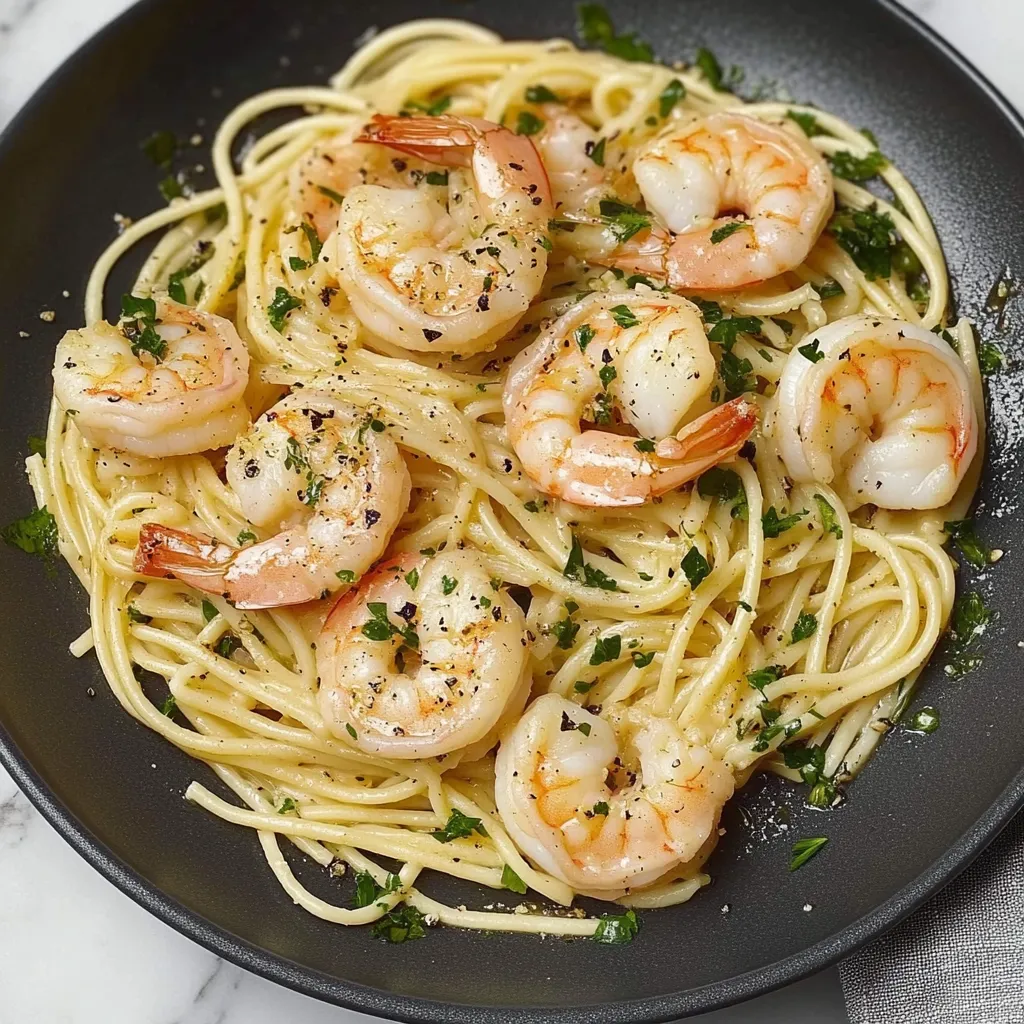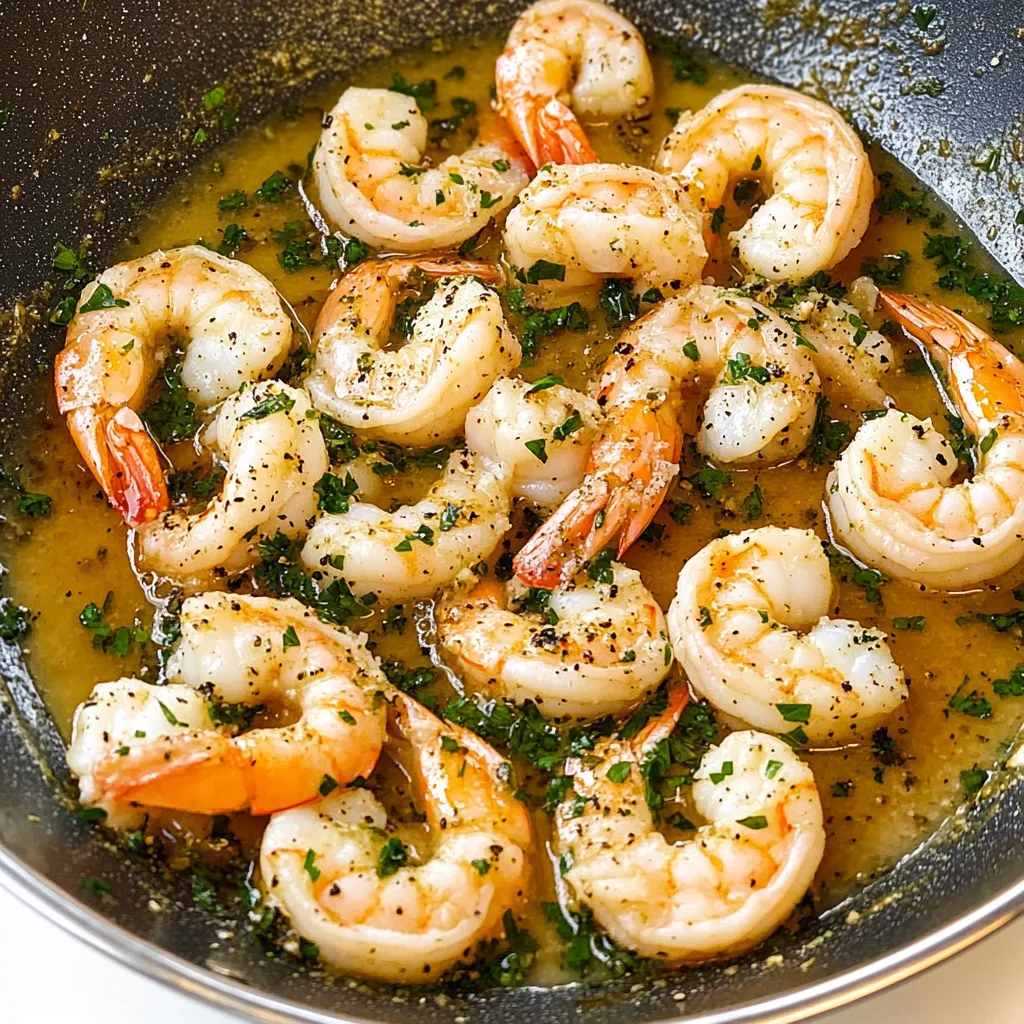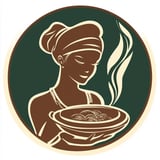 Pin it
Pin it
Shrimp scampi transforms simple ingredients into a restaurant-worthy meal with minimal effort. This Italian classic features plump, succulent shrimp bathed in a buttery, wine-infused sauce that's punctuated with fresh garlic and brightened with lemon and parsley. Ready in just 20 minutes, it delivers sophisticated flavor while being remarkably straightforward to prepare at home.
I first made this at home after paying nearly $30 for a disappointing restaurant version with tiny, overcooked shrimp. My homemade attempt with jumbo shrimp and plenty of garlic converted even my seafood-skeptical brother-in-law. There's something magical about watching those plump shrimp turn pink as they sizzle in the garlicky butter – it's one of those dishes where simple truly is better.
Essential Ingredients
- Jumbo Shrimp: Look for shrimp sized 21-30 per pound for the perfect meaty bite and impressive presentation
- Fresh Garlic: The backbone of this dish – don't be shy with it, as it creates the signature flavor profile
- Good Quality White Wine: Choose something you'd enjoy drinking, as its flavor concentrates in the sauce
- Unsalted Butter: Creates the rich, silky texture that makes this dish so luxurious
- Fresh Lemon: Not just a garnish – that final squeeze brightens everything and balances the richness
Step-by-Step Instructions
- Step 1: Prepare the shrimp.
- Pat 1 pound of peeled and deveined jumbo shrimp dry with paper towels, then season with ½ teaspoon kosher salt and ¼ teaspoon freshly ground black pepper. Working with dry shrimp ensures better browning and prevents them from steaming instead of sautéing.
- Step 2: Cook the shrimp perfectly.
- Heat 2 tablespoons olive oil in a large skillet over medium-high heat until shimmering. Add the seasoned shrimp in a single layer and cook for 1-2 minutes per side until they turn pink and just begin to curl. Be careful not to overcook – the shrimp will continue cooking slightly when returned to the sauce later. Transfer shrimp to a plate, leaving any juices in the pan.
- Step 3: Create the flavor base.
- Reduce the heat to medium and add 2 tablespoons unsalted butter to the same pan. Once melted, add 6 cloves of minced garlic and cook, stirring constantly, for about 30 seconds until fragrant but not browned. Garlic burns easily and becomes bitter, so watch it carefully – the goal is to release its aromatic flavor into the fat.
- Step 4: Build the sauce.
- Pour in ½ cup dry white wine and add ¼ teaspoon red pepper flakes (optional). Increase the heat to bring the mixture to a simmer, then cook for 2-3 minutes until the alcohol has evaporated and the sauce has reduced slightly, concentrating the flavors. The sauce should coat the back of a spoon but still remain loose.
- Step 5: Finish with butter and reunite with shrimp.
- Add the remaining 2 tablespoons butter to the sauce and swirl the pan until melted, creating a silky emulsion. Return the shrimp and any accumulated juices to the pan, tossing gently to coat in the sauce. Cook for another 1-2 minutes until the shrimp are heated through and fully coated with the luscious sauce.
- Step 6: Add fresh elements.
- Remove the pan from heat and sprinkle with 3 tablespoons chopped fresh parsley and a squeeze of juice from half a lemon. The residual heat will release the aromatics from the parsley while maintaining its bright color. Toss gently to incorporate these final flavor enhancers throughout the dish.
- Step 7: Serve immediately.
- Transfer to a warm serving platter or individual plates and garnish with lemon wedges. Provide crusty bread for soaking up the delicious sauce or serve over perfectly cooked linguine for a more substantial meal.
 Pin it
Pin it
I'm particularly attentive to the cooking time for the shrimp in this recipe. My grandmother always said that seafood should be treated gently, and I've found this to be especially true with shrimp. When I first started cooking shrimp scampi, I'd often leave them in the pan too long, resulting in tough, rubbery disappointments. Now I follow the visual cues religiously – once they're pink, opaque, and just curled into a C-shape (not a tight O-shape), they're perfect.
Selecting the Best Shrimp
The quality of shrimp makes all the difference in this minimalist recipe. I prefer wild-caught American shrimp when available, as they tend to have better flavor and texture than imported farm-raised varieties. While fresh is wonderful, high-quality frozen shrimp (thawed properly) can be excellent and more convenient. When prepping, leave the tails on for an elegant presentation and a handle for eating, or remove them for easier dining – it's entirely your preference. Either way, dry the shrimp thoroughly before cooking for the best sear and to prevent diluting that beautiful sauce with excess moisture.
The Perfect Wine Pairing
Not only does white wine create the foundation for the sauce, but it also makes the ideal beverage accompaniment. I typically cook with a crisp Pinot Grigio or Sauvignon Blanc, then serve the same wine with dinner for a harmonious pairing. The wine's acidity cuts through the richness of the butter while complementing the sweetness of the shrimp. If you're substituting chicken broth for the wine, consider adding a touch more lemon juice to maintain that bright acidity in the final dish.
Serving Suggestions
While this dish is traditionally served over pasta, don't feel limited by convention. I often serve it alongside roasted asparagus or a simple green salad for a lighter meal. For special occasions, I'll plate it over creamy risotto instead of pasta – the starchy rice absorbs the flavorful sauce beautifully. And there's something undeniably satisfying about serving it with nothing more than crusty bread and letting that extraordinary sauce take center stage.
Chef's Helpful Tips
Temperature management: The key to perfectly cooked garlic is medium heat – too high and it burns, too low and it doesn't develop proper flavor Sauce consistency: If your sauce is too thin, remove the shrimp and reduce it further; if too thick, add a splash of pasta water or broth Serving solution: Warm your serving plates in a low oven before plating – this keeps the butter sauce from congealing too quickly
I discovered the joy of homemade shrimp scampi years ago after a particularly disappointing restaurant meal. What began as a desire to recreate something better has become a signature dish that friends and family regularly request. There's something deeply satisfying about transforming such simple ingredients into something that feels special enough for celebrations yet easy enough for weeknight dinners. The way the kitchen fills with the aroma of garlic and wine, and how the sauce creates that perfect glossy coat on each plump shrimp – it's the kind of cooking magic that reminds me why homemade is always worth the effort.
Frequently Asked Questions
- → Can I use frozen shrimp for this recipe?
- Yes, frozen shrimp works great! Just make sure to thaw them completely and pat them dry before cooking to get a nice sear.
- → What can I substitute for white wine?
- If you prefer not to use wine, low-sodium chicken broth works perfectly as a substitute. You can add a splash of lemon juice for extra flavor.
- → What's the best pasta to serve with shrimp scampi?
- Linguine and angel hair pasta are traditional choices, but any long pasta works well. The thin noodles catch the light sauce beautifully.
- → How do I know when the shrimp are done cooking?
- Shrimp cook very quickly. They're done when they turn from gray and translucent to pink and opaque, which takes about 3-4 minutes. Overcooked shrimp become rubbery.
- → Can I make this dish ahead of time?
- Shrimp scampi is best served fresh. If needed, you can prep the ingredients ahead of time, but cook right before serving for the best texture and flavor.
